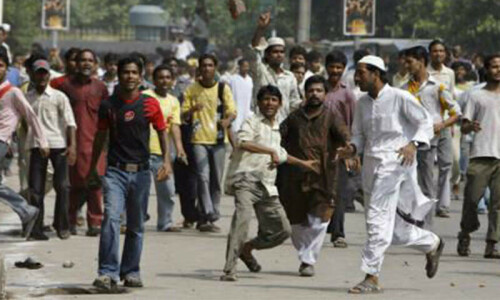KARACHI: It was such a delight to see Nadira Babbar essay the character of her mother Razia Sajjad Zaheer in a play titled Meri Maa Ke Haath at the Arts Council on Tuesday night. Only if our theatre audiences acted a bit sanely, keeping the decorum of watching a play in mind, the effect of the play would’ve been doubly delightful. Not to be. The phones kept ringing during the first half of the drama and voices kept coming from behind the stage in the latter half, terribly distracting the artist, who had to stop her act on a few occasions to get her rhythm back.
The ringing of the phones has become more than a nuisance now, because it happens at almost every cultural event; it’s time those who run cultural centres did something about it. One suggestion is that they should have volunteers stand at the entrance gate of the venue and make sure that each member of the audience either switches off their mobile phone or puts it on silent mode before stepping into the performance hall.
Now back to the play. Meri Maa Ke Hath is written and performed by Nadira, who is the wife of renowned Indian actor Raj Babbar and daughter of the eminent communist leader of the subcontinent Sajjad Zaheer. In the play Nadira plays her mother, Razia Sajjad’s character.
Bear in mind that Nadira was born a few months after the partition of India. So it was really remarkable to see an actor of her age do a one-woman show and narrate the various phases of Razia’s life.
The story begins from Ajmer when Razia was a burqa-wearing teenager and an aspiring writer. Then she receives a marriage proposal from Sajjad Zaheer in the traditional way and they get married, after which she shifts to Lucknow with her husband. Since her better half is a social and political activist, his life doesn’t allow Razia to settle down at one place. During that period Sajjad gets arrested. In the meantime, the couple has three daughters, and since Sajjad is often away from home for work, she has to look after the children. There comes a time when she even has to travel all the way to Pakistan to meet Sajjad in prison, and despite his insistence, doesn’t stay back and returns to India to begin life anew. Another girl is born, and Sajjad is asked by the Communist Party to move to Delhi, a move that Razia doesn’t initially like. Then gradually but surely, things start to look up.
Meri Maa Ke Hath, directed by Makarand Deshpande, is a thoughtful tribute to Razia Sajjad’s struggle in life. What’s mentioned between the lines is how women, no matter what stratum of society they belong to, sacrifice their personal life and goals for men with principles.
Of course, Nadira’s one-woman performance is worth praising, because despite the age factor, she was able to convey the message embedded in the script pretty convincingly.
Published in Dawn, November 29th, 2018













































Dear visitor, the comments section is undergoing an overhaul and will return soon.